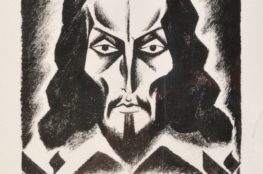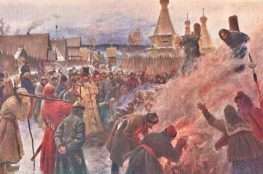Yesterday’s brief post, “Blessed Charlemagne,” attracted far more hits than expected, which, to be frank, delighted me a great deal. Last year, on the 1,200th anniversary of his repose, I found barely a mention in “blogdom,” though the good Redemptorist monks on Papa Stronsay, the Sons of the Most Holy Redeemer, made sure to include the anniversary in their superb wall calendar. This year’s edition proudly commemorates the 400th anniversary of “The Fifteen,” that is, the uprising to place James Francis Edward Stuart to the thrones of England, Ireland, and Scotland. Like the successor uprising of 1745, it proved a failure, but a failure worth honoring nonetheless.
We, good citizens of Western polities, are unaccustomed to paying much mind the “dark years” of monarchical rule and the painful episodes endured throughout Europe for three centuries which culminated in the practical obliteration of Catholic monarchism. We are equally unaccustomed to paying due reverence to that great cloud of royal witnesses who, for nearly 2,000 years of Christian history, ruled the peoples of the earth in the name of Christ and now, having completed their earthly pilgrimage, pray for the Corpus Mysticum before the Lord’s eternal throne in Heaven.
I speak here not only of Blessed Charlemagne, but also of Constantine the Great and Vladimir of Kiev, Equals-to-the-Apostles; the two Edwards, one a Confessor and the other a Martyr; and the compassionate and merciful Louis IX of France. I could speak, too, of Mary Stuart, Queen of Scots, who suffered and died unjustly under a regime entranced with hatred for the Catholic Faith. Of her death, this is what the erudite Pope Benedict XIV had to say, as quoted in Pius VI’s encyclical Quare Lacrymae:
If an inquiry into the martyrdom of this queen were set up (which has not yet been set up), a clear opposition to her martyrdom might be derived from the sentence passed on her, and from the impious ravings against her by the heretics, and in particular by George Buchanan, in his infamous book titled Detectio Mariæ. But if the true cause of death is examined, which is to be found in the hatred of the Catholic religion that remained in England as long as she survived—if her unconquered constancy is considered, by which she rejected the offered condition of abandoning the Catholic religion—if one looks to the admirable strength with which she bore death—if one attends, as one ought to attend, to her professions, both before death and during death, that she had lived always as a Catholic, and was very willing to die for the Catholic faith—if one does not overlook, as one ought not overlook, the very clear reasons proving that not only the falsehood of the crimes attributed to Queen Mary, but also the iniquitous sentence of death, clearly supported only by calumnies, truly proceeded from hatred of the Catholic religion, and so that the heretical dogmas might remain undisturbed in England—in light of these, nothing, perhaps, is lacking of those things which are necessary for true martyrdom.
And which other royal’s death “proceeded from hatred of the Catholic religion”? None other than that other monarch of France, Louis XVI, whose passing too many in the Church failed to honor on January 21. This was the lofty view of Pius VI, who declared, based on the available evidence, that the King of France had died a martyr’s death. Louis XVI had, in the words of Pope Pius, attained “victory in his passion” and “happily exchanged an impermanent royal crown, and lilies that quick fade, for another, permanent crown woven of the immortal lilies of the angels.” It would not, then, be out of place to add to add to our prayers:
O Almighty God, who didst call thy servant Louis to an earthly Throne that he might advance thy heavenly kingdom, and, when his throne was violently overturned, didst give him boldness to confess the name of our Savior Jesus Christ before the rulers of this world, and courage to die for this faith: Grant that we may in ready obedience accept both prosperity and adversity at thy hand, and that we may always be ready to give a reason for the hope that is in us, and to suffer gladly for the sake of the same our Lord Jesus Christ; who liveth and reigneth with thee and the Holy Ghost, one God, world without end. Amen.
Contrary to common wisdom, which is typically rather dull, I see no reason for Catholics to be either embarrassed or bashful about who we count among the Church Triumphant simply because the political winds have changed and we remain battered by the ongoing storm of liberal ideology. The earthly lives of many royal saints, like the earthly lives of so many holy souls who rejoice now with the angels, were not without complications, and we should not shy away from the hard facts anymore than we should succumb to present prejudices, calumnies, and fictions which would paint those whom God appointed to rule as thoroughly rotten. Rather, we should rejoice that the Lord, in His providence and grace, lifted up even those who sometimes succumbed to the temptations which so often accompany temporal power and now listens to their prayers on our behalf. For in the end we are all subjects before the Universal King, Christ our God, and it is to his power and glory we, united with all the saints, give thanksgiving praise, now and ever, and unto ages of ages.



